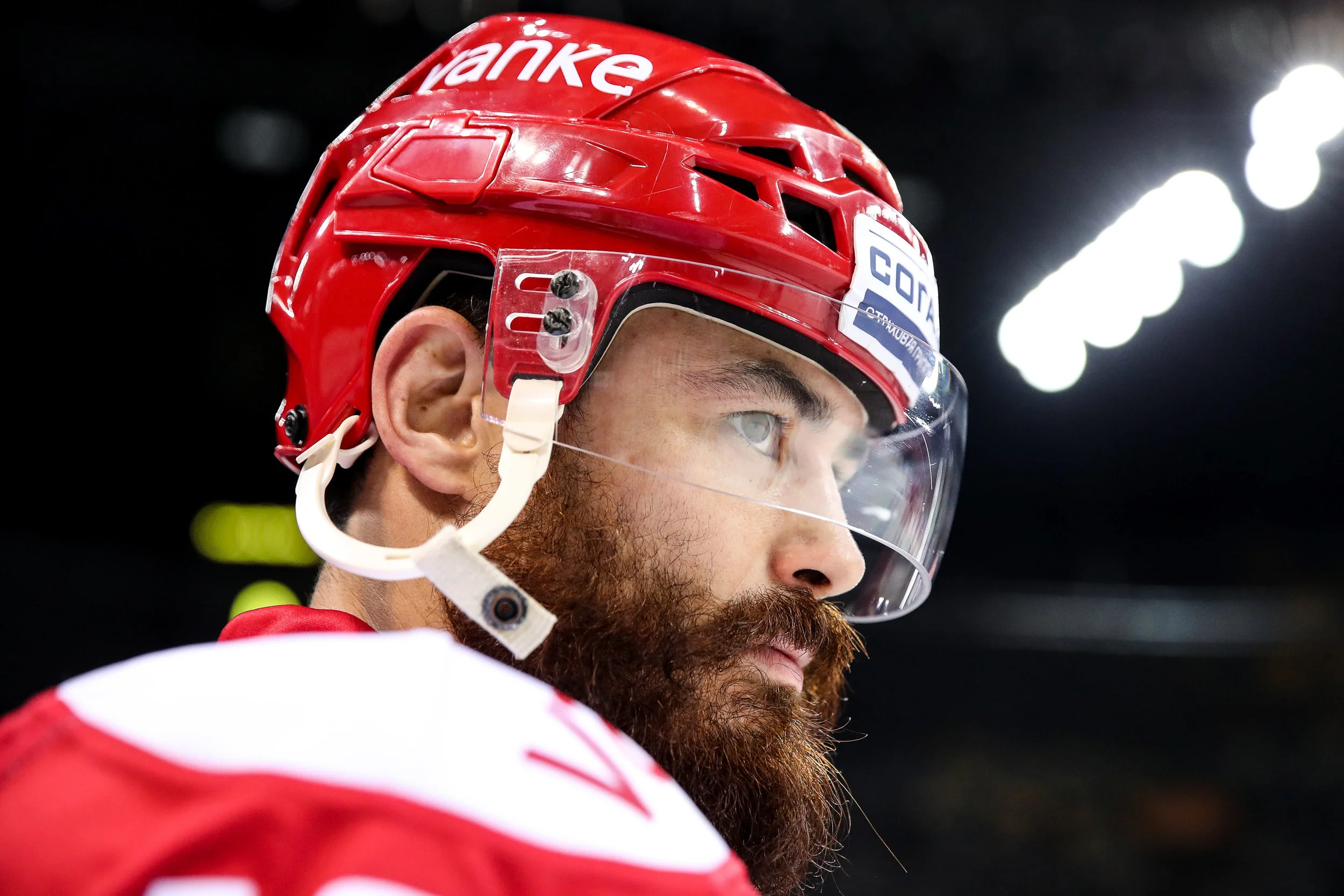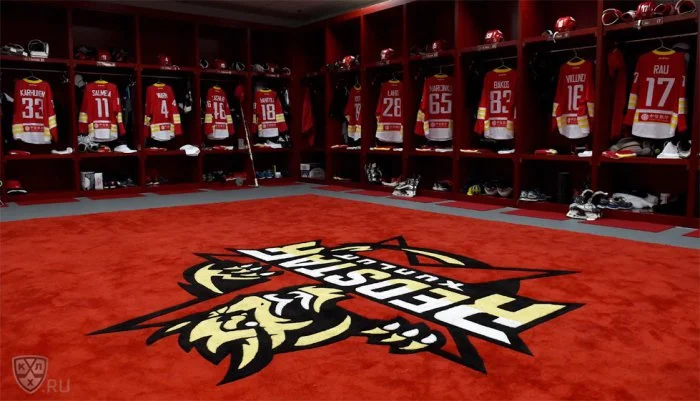THE DRAGON ENFORCER
ECHL PIM record-holder Garet Hunt could be considered a new line of Chinese defense on par with the Great Wall. Notching two noteworthy fights before the first road-trip of the season had even begun, the 31-year-old left wing has quickly sent a message to his new league: China will not be pushed around, and violators will face consequences.
I caught up with the former Stockton Thunder fan favorite during the team’s first home series in Shenzhen, where he had already made a statement.
A version of this article first appeared in Russian on Спорт-Экспресс under the title, “Он избил соперника шлемом, а потом подрался с русским «монстром». Интервью канадского тафгая.”
You have an interesting connection not only to China, but also to the city where Kunlun opened its season.
Yeah, my grandparents are from China—they were born and raised in the area surrounding Shenzhen. They immigrated to Canada, and it’s interesting that I am back here now with the opportunity that they gave me—playing for a Chinese hockey team, in China.
When did you decide to play for Kunlun?
I was talking to Scotty [MacPherson] in the summer after my season ended, and he found out that I had some Chinese heritage. I came over for [Olympic development] camp in May, and everything happened really fast. I finished my playoffs and two weeks later I was over in China. A couple weeks after that, the pre-season was starting here. Everything just fell into place.
You hold an interesting—albeit controversial—record: the ECHL’s most penalty minutes. Are you proud of that?
[Laughs] It was hard-earned! I put in a lot of time in the ECHL, and there were a lot of guys that I respect who gave me the opportunity to get those penalty minutes. It was a lot of years and the hands are sore, but I earned it.
Obviously it’s hard to say that you’re proud of getting penalties because sometimes you’re putting your team down, but at the same time, it’s just something that comes with the game. I definitely earned it the hard way.
Can you pinpoint the day that you first stepped into the enforcer role? Were you defending your turf on the playground?
Yeah, I can remember. When I was younger, I always wanted to play on the best team and I wasn’t the best player. I think my dad told me, “You’re not the best player—but if you want to make the team, you have to do what nobody else wants to do.” So I just did what I had to do to stay on teams. It was different back then—you could fight, and people loved it!
When my Dad said that ‘you could never cut a guy who was fighting all the time,’ I went to training camps and did what I had to do. It stemmed from there and got my foot in the door. I’ve had that role since I was 12 or 13 years old.
I just finished Gordie Howe’s biography, Mr. Hockey. He was one of the tougher figures in NHL history, but everyone always comments on what a gentleman he was off the ice. Would they say the same about you?
What happens on the ice, stays on the ice. Obviously Gordie Howe was a lot more than just ‘the aggressor’ on the ice. He was the total package.
This role got my foot in the door, but after, you have to bring something else: maybe leadership, or the penalty kill. The more things you bring, the more valuable you are to the team.
All the toughest guys I’ve fought are the nicest guys off the ice. I’ll be honest: Trevor Gillies and I still talk. He couldn’t be more happy that I am over here. Those are the first guys who you go with for a drink after the game. It seems crazy to the people who think it’s all premeditated, or who think you’re not really fighting to hurt each other—you’re fighting for your job and your livelihood. But after the game, it’s over…and life goes on.
How would you evaluate the toughness of the KHL players versus the ECHL?
In the ECHL, there are a couple of tough guys on every team. It’s obviously a lower league where guys have an opportunity to get their foot in the door by fighting. I respect that because I was there too, and I have nothing to say against them. The KHL is a lot more skilled and European style—but of course there are still some big guys. Thinking back to Game 1 [versus Salavat Yulaev], there is Semenov—he’s a monster. And he was answering the bell.
I want to go back to that massive preseason fight in China. You took a lot of heat for that in the Russian press.
I was doing what I had to do to keep myself here, and to show that I am willing to do whatever it takes. For the organization, we needed to let teams know that China will stick up for themselves and I’m willing to do that. We are not going to get pushed around.
And then there was Game 1 versus Semenov, who you already mentioned…
He’s a big guy and has been around a lot. He knows how to handle himself—and we both knew it was going to happen. Second shift, I took care of it.
I did make a pretty good hit, and he came over to keep me honest. There’s the reason right there on why you need fighters: I made a big hit, and he came over to stick up for his teammate. If he were to make the same hit against a guy on our team, I would go over and try to fight him. I owed him a fight after making that hit.
Is there any fight of your career that you wish you could take back?
Not one! I try not to fight at the ends of games or for no reason. I always fight to set the tone, change the momentum, or stick up for teammates. I’m not out there fighting for myself to look cool—at the end of the day, it’s my job.
What were some of your concerns ahead of moving to China?
The food! I’m kinda picky. I came over in May and kept having a stomachache, but I’ve adjusted well and they’ve done a really good job with the food for us. Maybe the travel—but as you said, I played in the ECHL and the travel there is a grind. We would get on a bus for ten hours and arrive at 5 am having to play an afternoon game. I knew some guys who had played in the K like [Victor] Bartley and Brandon [Yip]; we grew up together, so I was able to talk to them over the summer. Nothing was too much of a surprise, and the organization has been great.
I understand you had your Stockton jersey retired. What did that mean to you?
Yeah, a couple years ago. It was a really cool experience for me and my family. It was satisfying for all the hard work that my family put in—my grandparents driving me to the rink, or my brother practicing with me. To have my jersey retired was a little bit of gratification to them, and all their hard work.
For me personally, it was a really big honor. I loved Stockton, California—I played there for seven years. I have made great friends there and had a life away from hockey. The team obviously got moved, so they retired my jersey…that was probably the highlight of my career. It’s hard to say that because you always want to say team-related things. But when you think of how many guys you played with, and how many guys helped you get that jersey retired, it still is a team achievement. It’s hard to explain it. All the guys who gave me opportunities to get me to that point—it’s pretty special.
You’ve mentioned your Dad a few times in this interview. Did he play too?
He never played hockey! He just gave it to me straight. If I played bad, then he’d say that I played bad. But he never really cared about how I played, as long as I worked hard.
He’s never scolded you for a fight? Like, “Garet, this time you went too far…”
No, he doesn’t care if I win or lose. He told me from day one—you’re not going to win every fight, it only matters that you show up.
We’ve talked a lot about fighting, but we need to note that you had two solid chances against Ufa.
Yeah, that would’ve been nice! A lot of people think that I’m just a fighter, but I am trying to better my game. This is my twelfth year as a professional. There is always someone coming up who is younger and willing to fight, so I have to bring other things like good line changes and good energy on the bench, that way coaches will trust me and put me out there.







